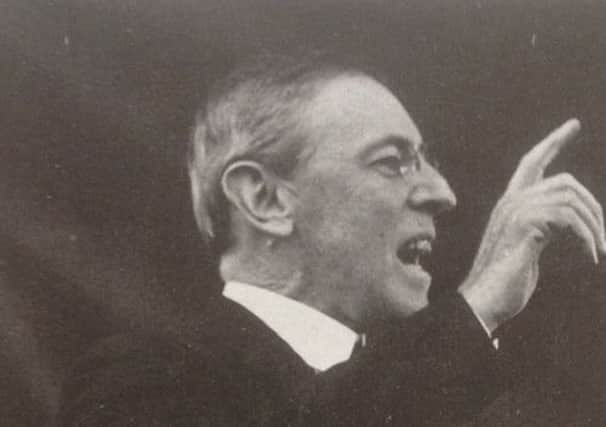Academic President very proud of his Ulster roots


This son of a Presbyterian minister, born in Staunton in the Shenandoah Valley of Virginia in 1856, guided the United States through the First World War and was awarded the Nobel Peace Prize.
President Wilson’s paternal grandfather James Wilson emigrated from Strabane via Londonderry in 1807, while his maternal grandfather the Rev Thomas Woodrow was a native of Paisley in Scotland who moved to America in 1835 to take up a Presbyterian congregational charge in Ohio.
Advertisement
Hide AdAdvertisement
Hide AdJames Wilson was 20 when he sailed from Londonderry to Philadelphia, having grown up in the rural hamlet of Dergelt, two miles from Strabane. He had just completed his apprenticeship as a printer at Gray’s Shop at Bridge Street, Strabane, when he moved and remains of the Wilson homestead at Dergelt are still preserved to this day and descendants of the original family reside in the area.
A previous employee at Gray’s print shop was John Dunlap, who printed first copies of the July 4, 1776 Declaration of Independence and founded the first American daily newspaper, The Pennsylvania Packet. There was a close connection between Gray’s and America and, when James Wilson arrived in Philadelphia, John Dunlap was still alive and the Ulster link sustained.
James Wilson worked at the Democratic newspaper The Aurora and within five years he was the paper’s owner. He was a Democrat in the Benjamin Franklin mould and, when he moved to Ohio, became editor of the Western Herald and Gazette in Steubenville. He was a Democratic representative in the state legislature and assistant judge at the Court of Common Pleas.
James Wilson’s wife Anne Adams – they married in Fourth Philadelphia Presbyterian church in 1808 – was a Co Down woman and the couple had 10 children, seven sons and three daughters. Youngest and seventh son Joseph Ruggles Wilson became a scholarly Presbyterian minister and his third child was President Woodrow Wilson. The President’s mother was Jessie Woodrow, from Carlisle in England, who emigrated to America with her family when four.
Advertisement
Hide AdAdvertisement
Hide AdPresident Wilson often spoke of his Scots-Irish background, claiming with great pride that he had inherited the stern, strongly independent characteristics of the Scottish Covenanters. Speaking at a St Patrick’s Day rally in New York in 1909, when he was President of Princeton University, he said: “I myself am happy that there runs in my veins a very considerable strain of Irish blood”.
In 1913, a year after he was elected to his first term as a Democratic, President Wilson said: “I am sorry that my information about my father’s family is very meagre. My father’s father was born in the north of Ireland, he had no brothers on this side of the water. The family came from the neighbourhood of Londonderry”.
Woodrow Wilson visited Ireland in August 1899, taking in both north and south. He made it to Belfast, but the only evidence of his trip is in a letter located amongst his personal papers, written on August 20 from the White Horse Inn, Drogheda, Co Louth.
Wilson was then professor of jurisprudence and political economy at Princeton University and, apart from academic friends, few in Ireland would have been aroused by his 1899 visit. He did not reach North Tyrone to trace his grandfather’s roots.
Advertisement
Hide AdAdvertisement
Hide AdWilson’s 1913-21 Presidential term coincided with the years of bitter Irish political struggle, but, despite pressure on him from Irish American elements in the Democratic Party to intervene on behalf of Irish nationalists, the President wisely did not get involved.
He saw the Irish situation as purely an internal British matter and did not perceive the dispute and the unrest in Ireland as comparable to the plight of various nationalities in Europe in a fall-out from the First World War. He ignored a letter from Irish nationalist leaders in 1918 calling on the United States to back disengagement of British interests in Ireland. The nationalist letter was countered by a communique from Ulster Unionist leaders, including Lord Edward Carson, but the President was unmoved.